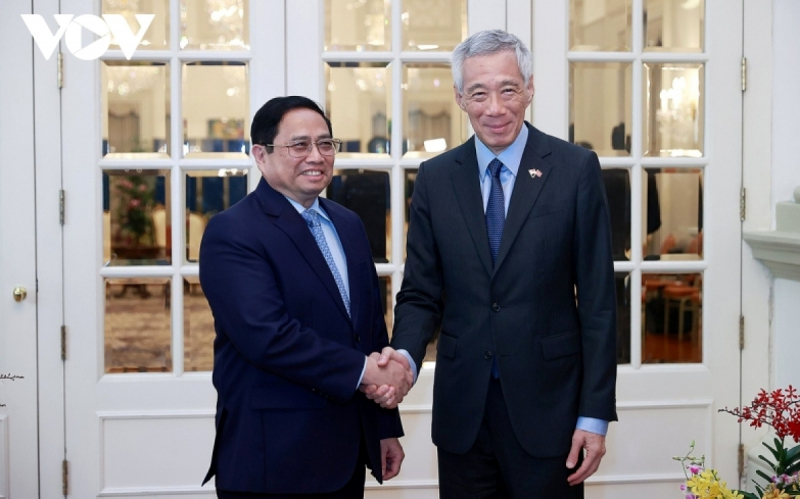Vietnam, Singapore to build on half-a-century success story towards new heights
Vietnam and Singapore have developed their relationship effectively over the past five decades on the back of their high political trust and great potential, meaning they have more room to bring their strategic partnership to new heights moving forward.
Both sides officially established diplomatic relations on August 1, 1973, and their co-operative ties have developed substantively over the past five decades, especially after the two countries upgraded their ties to that of a Strategic Partnership in 2013.

The mutual relationship has become increasingly closer, with high reliability, through reciprocal visit exchanges by ranking officials and as evidenced in fruitful cooperation in the fields of politics - diplomacy, economics - trade – investment, and security – defence, among others, said Ambassador Mai Phuoc Dung in a recent interview granted exclusively to VOV.
According to the diplomat, the two countries immediately resumed reciprocal visit exchanges after the COVID-19 pandemic was successfully brought under control. Vietnamese Prime Minister Pham Minh Chinh visited Singapore in February, whilst Singaporean Prime Minister Lee Hsien Loong is expected to visit Vietnam in late August this year.
Economic, trade, and investment linkages are a major pillar in bilateral relations. Singapore has been the country’s leading foreign investor over the past few years, with its registered capital amounting to US$9 billion and US$10.7 billion in 2021 before falling to US$6.45 billion in 2022 due to the impact of the COVID-19 pandemic and geopolitical fluctuations occurring in the region and around the world.
Currently, Singapore has more than 3,000 valid projects valued at US$70 billion in Vietnam, ranking second after the Republic of Korea.
The model of the Vietnam-Singapore Industrial Parks (VSIPs) represents a success story in bilateral ties as these VSIPs have been operating effectively and constantly expanding operations nationwide. At present, there are 14 VSIPs operating in localities across the country, attracting US$17 billion in terms of investment capital and creating more than 300,000 jobs.
Singapore’s investment in the Vietnamese market is diverse, focusing on fields such as processing and manufacturing, real estate, electricity production, wholesale and retail, science and technology, and information and communication. The island state has so far poured investment into 51 out of 63 Vietnamese provinces and cities, with Ho Chi Minh City, Hanoi, and Binh Duong receiving the most investment capital from Singapore.
Security – defence cooperation is also a major highlight in terms of bilateral relations. In 2022, the two countries signed a new defense cooperation agreement after a decade of negotiations, laying a firm legal foundation to promote comprehensive cooperation programmes across all fields, especially in information sharing and rescue work. They have also cooperated well in new security fields such as cybercrime and cross-border crime prevention.
During PM Chinh’s visit to Singapore in February, the two countries established a Green and Digital Economy Partnership which is considered to be an important milestone in spurring connectivity, as well as green growth and sustainable development between the two countries during Industry 4.0.
According to Ambassador Dung, the green economy and digital economy is one of Singapore’s strengths, and the island state is the regional leader in signing digital economic agreements with countries.
“The digital economy is also one of Vietnam’s top priorities today, and I think this is a field where the two sides can further strengthen cooperation, and share experiences and initiatives,” said the diplomat.
Similarly, he said the green economy is also a field where the two sides can complement each other in order to achieve the goal of reducing greenhouse gas emissions to zero by 2050.
As a small island state, Singapore has no advantages in terms of developing alternative energy sources, although it boasts strengths in technology and experience. Meanwhile, Vietnam features a long coastline of more than 3,200km, meaning that it has great potential for developing renewable energy, especially offshore wind power that is anticipated to hit more over 100 Gigawatts in capacity.
“Obviously, ramping up cooperation in this field will help both sides achieve the sustainable development goals. During Prime Minister Chinh’s visit in February, Vietnam also pledged to export clean electricity to Singapore as soon as conditions permit,” noted the Ambassador.
Given their huge potential and complementary mechanism, the two countries have more room to further expand ties as part of efforts to bring their partnership to new heights, said Ambassador Dung.
To this end, he suggested that the two sides effectively promote existing cooperation mechanisms, including the annual political consultation, and prioritise cooperation in the fields of their strengths, such as the green economy and digital economy, along with high technology, innovation, and renewable energy.
Furthermore, he said the two sides should also continue to work closely together at multilateral forums, specially within the framework of the UN and mechanisms led by ASEAN.

